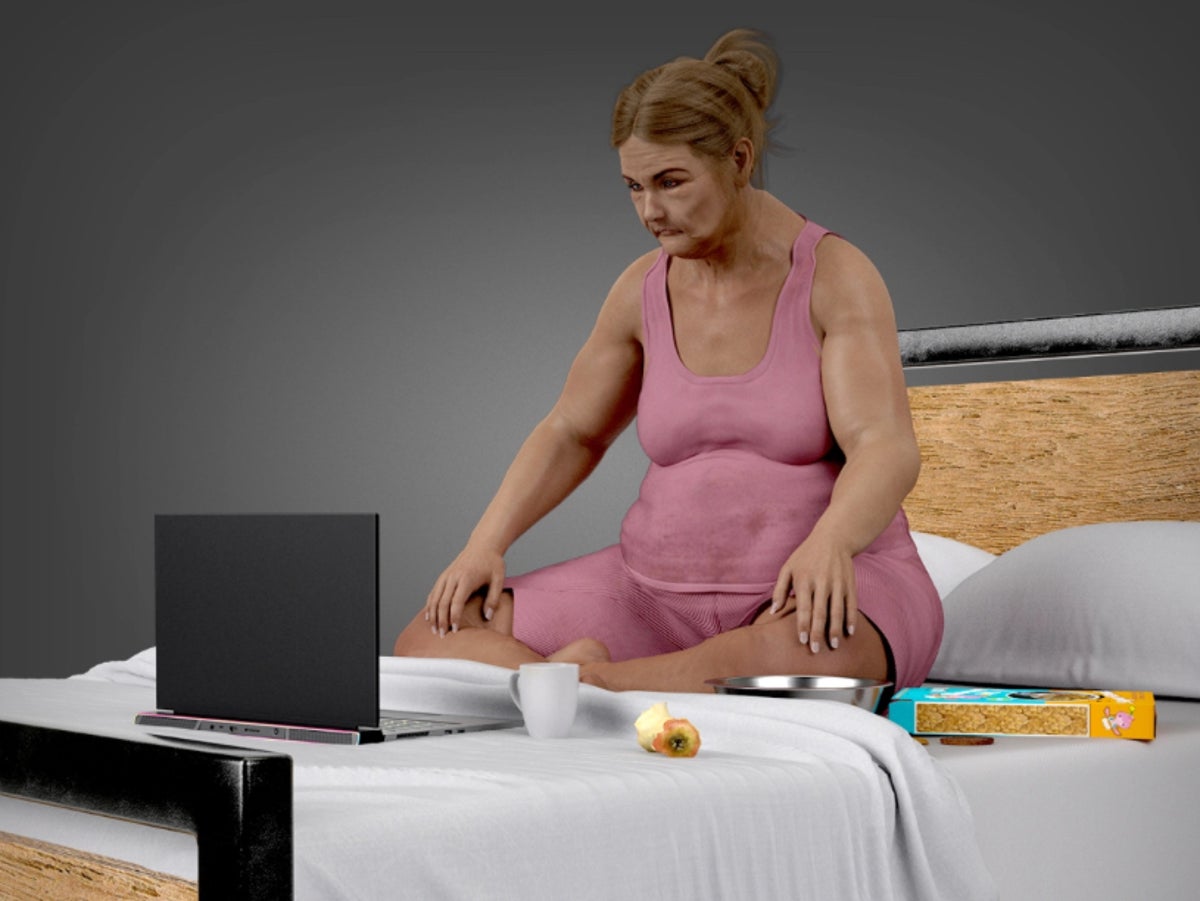
A 3D model created by a furniture company that allegedly depicts how remote workers will look in 70 years has sparked widespread amusement on social media.
Last week, the DailyMail published an article about a “grotesque” 3D model dubbed “Anna”, which purportedly shows the impacts of working from home on the body.
According to the outlet, the model, which was created by office furniture company Furniture At Work, “revealed what home-workers could look like by the year 2100”, with the graphic showing a woman with a hunchback, dark eye bags and wrinkled features, and “claw-like hands” from years spent working remotely.
“Anna displays many physical effects because of consistent use of technology, screen exposure and poor posture, as well as highlighting potential mental health issues,” Furniture at Work said of the model, which was dressed in a pink workout set and which could be seen holding its elbows at a right-degree angle and its hands in a tense, clawed position.
In the article, the outlet noted that the furniture company created Anna following “research from the University of Leeds, which found that a third of UK home-workers have no dedicated workspace at home”. According to the furniture company, in addition to “scientific research”, it “worked with healthcare experts to reveal what the remote worker of the future could look like”.
As for why Anna’s hands are depicted in the claw-like position, the company said it was meant to show the impact of hours spent with one’s hands curled around a mouse, while Anna’s hunched back is due to time spent working bent over in bed.
However, on social media, the exaggerated depiction has largely been met with amusement from viewers, with many suggesting the model is “corporate propaganda” intended to encourage workers to return to the office.
“This return-to-office propaganda is getting wild,” one person tweeted in response to the article, while another said: “They are doing anything and everything to get us back into the office.”
Someone else sarcastically claimed that the model was proof the only way to avoid turning into a “misshapen goblin” was to return to in-office work. “Avoid turning into a misshapen goblin by sitting in a car for an hour to come sit at a desk for eight hours every day. It’s much healthier,” they wrote.
Others joked about the differences between in-office workers and remote workers, with one person suggesting that, unlike Anna, those who have returned to the office will “develop long, gorgeous, prehensile tails that can easily pluck slightly-expired luna bars from the office kitchen”.
The article also inspired various memes, with someone else tweeting: “This is what remote workers will look like in 2100,” along with a photo of a crab illustration, while another person tweeted a photo of a skeleton along with the caption: “What I, a remote worker, will look like by 2100.”
“Jokes on you, I already look like that,” one person jokingly tweeted, while another said: “Ah yes, because using a computer at home is way worse for you than using a computer at the office!!”
According to someone else, the “most unrealistic thing about the prediction is that there will still be a recognisable human civilisation in 2100”.
The DailyMail’s recent article also prompted many to point out that this isn’t the first time the outlet has published a story about the impacts of work on the body, as it previously published an article about the negative ways in-office work will affect the body. The 2019 article showed a “grotesque model of how office workers could look in 20 years’ time thanks to hours at their desk”.
“Lol this is just rehashing this from...Oct 2019. Note the spin…” one person tweeted alongside a screenshot of the article, which included a model named “Emma”.
The furniture company’s model also prompted many to defend the idea of remote work, with one person revealing that they are “more productive” and now enjoy a better work-life balance as a result of working from home.
“Hmm I’ve lost 20lbs, do yoga daily, am more productive, and my work life balance is 70,000 per cent better since starting remote working,” they wrote. “Must be doing something wrong? Or, ya know, this is some incredible bulls**t propaganda. TBD.”
On Twitter, where the DailyMail’s link to the article has been viewed more than 16.7m times, users have attached a context section to the tweet that reads: “Nobody has predicted that this is what home workers will look like by 2100.
“These images were created by an office furniture company ‘to visualise the effects of not having a proper place to work at home’ and ‘to reveal what the remote worker of the future could look like’”.
The article and the 3D model have since been added to the KnowYourMeme website, a database that defines meme-worthy moments on the internet. “Many commenters chalked ‘Anna’ up to fearmongering sensationalism on the part of the DailyMail and Furniture at Work, and were much more apt to crack jokes and make memes about the paper’s bleak prognostication than fear for the future of humanity,” the outlet notes.
As of 19 June, Furniture at Work’s blog post about “Anna” appears to have been taken down.
According to data from the US Census Bureau, between 2019 and 2021, the number of people primarily working from home tripled from 5.7 per cent (roughly nine million people) to 17.9 per cent (27.6 million people).
The Independent has contacted the DailyMail and Furniture at Work for comment.







